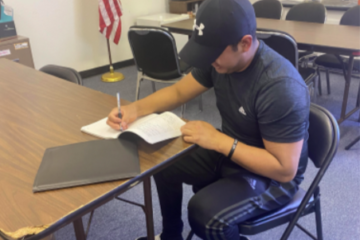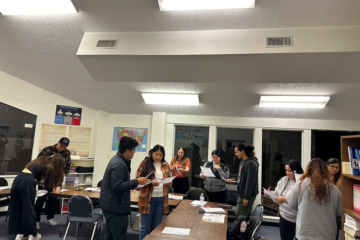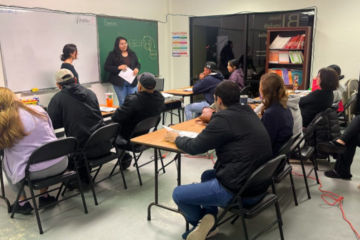Immigrating to the U.S. is a long, hard process, requiring years of effort, patience and persistence. Angela Suarez knows, for she and her family have been taking the steps required to immigrate and become citizens of the U.S. for decades. Their story reveals many of the challenges and obstacles that immigrants face, as they follow the process required by U.S. laws.
For Angela’s family, the story began in Colombia, the country that their family had always considered home. Angela and her two younger sisters were born there, and Angela dreamed of becoming a psychologist when she was done with college. However, by the 1990s, conditions in Colombia felt increasingly tenuous, due to on-going conflict between the government and armed guerilla groups, the expansion of the drug trade, and the ways that ordinary citizens were often subject to violence. Angela’s mother had a sister who had already become a U.S. citizen. She applied for Angela’s family to gain entry to the U.S. under family preference rules. By the time the paperwork came through in 2000, Angela was already 21, and thus ineligible to be included. So she stayed in Colombia, to finish college and begin working, while the rest of her family left for the U.S.
This was a first hardship: accepting that they would have to be apart and not knowing how long their separation would last. As Angela pointed out, “In Latin culture, we all want to be together.” The value attached to being with extended family made it particularly painful not to be together for Angela’s graduation from college, on holidays and other special occasions. But the family was committed to following the letter of the law, anticipating the day when it would be possible for Angela to join them in the U.S.
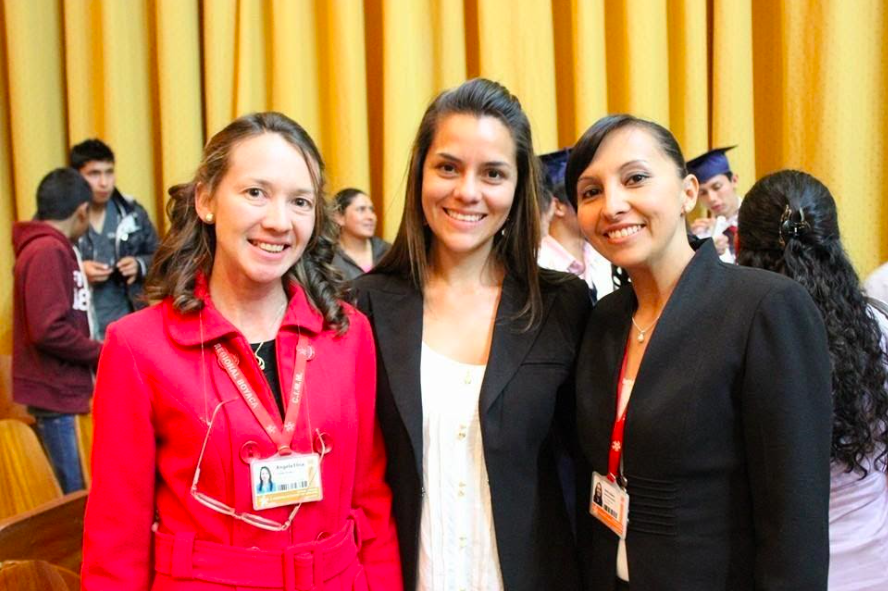
After Angela’s mother had been a legal permanent resident for several years, she applied for Angela to be able to join the family. However, it was not until 2014 that the request was granted. By this time, Angela had established a life for herself in Colombia: she had a thriving practice as a psychologist, a close circle of friends, a relationship with a long-term beau, etc. The residency permit would expire within six months, so Angela had to decide quickly. Out of a sense of filial loyalty, she closed her practice, said good-bye to her friends, and left for the U.S., arriving in California, where her parents and sisters lived, in September 2014.
Angela recalled the many difficulties of her first few months in the U.S.: living in a small apartment with multiple adults and her sister’s young child; having no job and limited English; and realizing that the professional qualifications and record she had established in Colombia meant nothing in the U.S. She would have to start over: learning English, finding paid work, and gradually figuring out how to expand and leverage the skills she had.
Dismayed by the cost of living in California, Angela decided to try her luck elsewhere. In early 2015, through friends of friends, she ended up in Austin, Texas – drawn both by the presence of the university and the fact that she had a place to stay for a couple of weeks. She still had to hustle to find a foothold: she recalled the confusion of finding her way around Austin by bus and on foot, stopping in a police station to recharge her phone. She went to Workforce, day after day, to get help revising her résumé, finding out about job postings and practicing for interviews in English. She spent hours looking for decent but affordable places to live, knowing that her time on the couch of the friend of a friend was running out. Finally, she lucked out, finding a room to rent in a shared home, and two low-paying jobs: one caring for elderly and disabled people in their homes, and another working in a childcare center. After working and taking the bus across greater Austin for five months, she was able to buy a cheap car that made it easier to get around. She also enrolled in English classes at Austin Community College, knowing that this was crucial for moving into more rewarding and better paid work.
Gradually, things improved. By 2016, Angela was working as an instructional aide for culinary arts classes in a high school in the Austin area. Her English was improving, she had managed to find a way to support herself, but she still dreamed of finding a partner and being able to have a family. By then she was in her late thirties, and she felt that she couldn’t just sit back and wait to make the right connection. Heeding advice from family and friends, Angela decided that to find a partner who shared the same faith, she should make a point of attending church. One day, while reading the church bulletin, Angela saw a notice for CatholicMatch.com. She joined the online service, and soon found herself dating a man who seemed like a great match: not only was he Catholic, but he had grown up in Texas as part of a large Mexican-American family, he worked at Texas A&M, and gushed enthusiasm for all things Aggie.
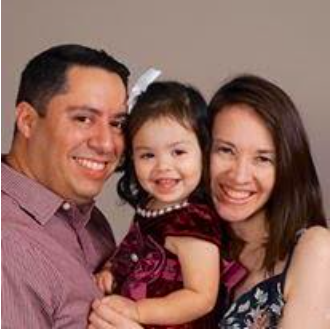
After several months of dating, getting to know each other and being welcomed into their respective families, Angela Suarez and Adrian Garza decided to get married. They have just celebrated their third anniversary and are the proud parents of a lively two-year-old daughter. After moving to Bryan, Angela worked for a time as an instructional aide at Bryan ISD, in a program for “new arrivals” who speak no English; she could certainly empathize with those children’s needs. Due to the pandemic, Angela is currently at home full-time caring for their daughter, but as conditions improve, she wants to continue to use her skills to help others, and hopes to be able to work again as a psychologist.
Angela knew from her parents and sisters that she needed to be a legal permanent resident for five years before applying for U.S. citizenship. Approaching that point in 2019, she started to look for citizenship preparation classes in the B/CS area, and discovered BIIN. In the fall of 2019, Angela started attending BIIN’s citizenship classes in English. She continued in the spring of 2020, and submitted her application for naturalization, around the time that the pandemic led both to the suspension of BIIN’s in-person programs and the temporary closure and ensuing slow-down of the process at US Citizenship and Immigration Services offices. When BIIN resumed its citizenship classes via Zoom in August, Angela was eager to join in again.
While she could certainly prepare for the naturalization exam and interview on her own, Angela prefers to hone her skills by attending BIIN’s classes. As she explained, “I have the materials from USCIS, and I could study on my own, but it’s better to be part of a community of people. At BIIN, the teachers really know the material. I like how they explain it and how they teach you strategies to remember things.”
What BIIN offers to prospective citizens like Angela is not just help in preparing for the exam, but also the recognition that they and their experiences matter. As she put it, “The teachers care about us. They care that we really learn the material and that we pass the test. It costs a lot of money and takes a lot of effort to become a citizen. It’s so much better to do it in a place that supports you and shares resources with you – a place like BIIN where there are people who really care what happens to you.”
As the stories of Angela, her family and others remind us, it is hard to be an immigrant. It is hard for all of the reasons that Angela points to, and for many other reasons as well. But through the welcome and support that organizations like BIIN provide, the long process of leaving one home and gradually making a new one in another country can feel not quite so daunting and not so impossible.
Thanks to everyone – from teachers and volunteers, to donors and staff working behind the scenes – who make programs like the citizenship classes possible. And thanks to Angela and her family, for enriching our community as neighbors and colleagues, for sharing their stories, and for reminding us that no matter what difficulties we are facing, it’s always “better to be part of a community of people.”
